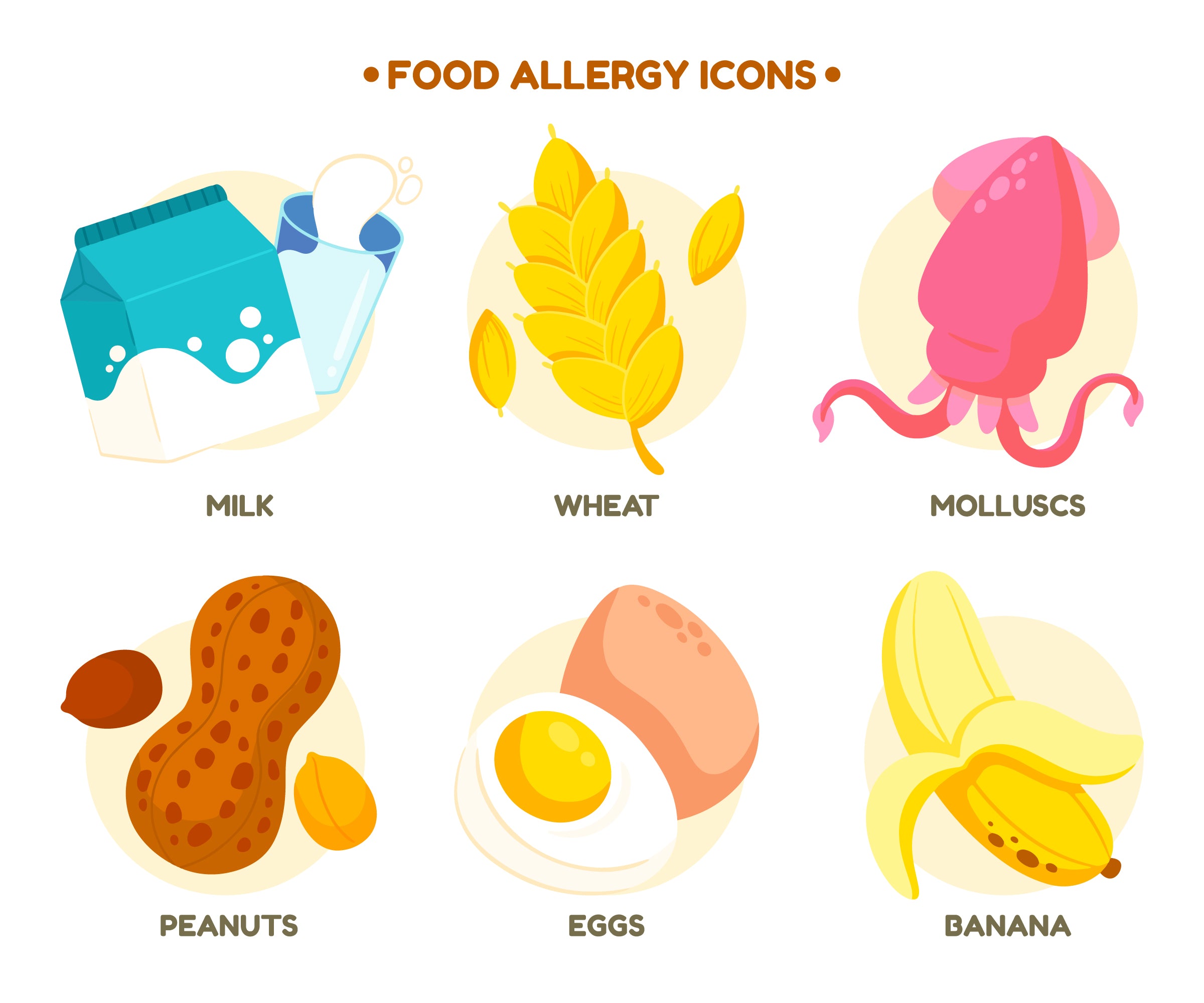Food Intolerance Test in Dubai - Food Allergy Test in Dubai
Food intolerance symptoms can vary widely among individuals, and they may manifest in different ways. It's important to note that the symptoms of food intolerance are generally not life-threatening and are distinct from the immediate and potentially severe reactions associated with food allergies. Here are some common symptoms that may indicate a food intolerance:
1. Gastrointestinal Symptoms: (Food Intolerance Test Dubai- Food Allergy Test Dubai)
- Abdominal pain: Discomfort or cramping in the abdominal area.
- Bloating: Feeling of fullness or tightness in the abdomen.
- Flatulence: Excessive gas production.
2. Digestive Disturbances: (Food Intolerance Test Dubai- Food Allergy Test Dubai)
- Diarrhea: Increased frequency and loose consistency of bowel movements.
- Constipation: Difficulty passing stools or infrequent bowel movements.
- Nausea: Feeling of queasiness or the urge to vomit.
3. Respiratory Symptoms: Food Intolerance Test Dubai- Food Allergy Test Dubai
- Nasal congestion: Stuffy or runny nose.
- Sneezing: Repeated or sudden sneezing.
- Coughing: Persistent coughing.
4. Skin Reactions: (Food Intolerance Test Dubai- Food Allergy Test Dubai)
- Eczema: Inflammation of the skin, often accompanied by itching.
- Rashes: Red, itchy, or irritated skin.
- Swelling: Swelling of the face, lips, or other areas.
5. Headaches: (Food Intolerance Test Dubai- Food Allergy Test Dubai)
- Migraines or tension headaches: Recurrent headaches that may be triggered by specific foods.
6. Joint Pain: (Food Intolerance Test Dubai- Food Allergy Test Dubai)
- Arthralgia: Pain or discomfort in the joints.
7. Fatigue: (Food Intolerance Test Dubai- Food Allergy Test Dubai)
- Feeling tired or lethargic without an apparent cause.
8. Mood Changes: (Food Intolerance Test Dubai- Food Allergy Test Dubai)
- Irritability: Unexplained feelings of frustration or irritability.
- Anxiety or depression: Changes in mood that may be linked to specific foods.
9. Heartburn: (Food Intolerance Test Dubai- Food Allergy Test Dubai)
- Gastroesophageal reflux: A burning sensation in the chest or throat.
It's important to remember that these symptoms can be caused by various factors, and experiencing them doesn't necessarily indicate a food intolerance. If you suspect a food intolerance, it's advisable to consult with a healthcare professional. They can help identify potential triggers, recommend appropriate diagnostic tests, and guide you through a proper management plan, which may involve dietary changes or other interventions. Keep a detailed food diary to record your symptoms and share this information with your healthcare provider for a more accurate assessment.
Food allergy, food intolerance, and celiac disease are distinct conditions with different underlying mechanisms and effects on the body. Here are definitions for each:
1. Food Allergy:
- Definition: A food allergy is an immune system response to a specific food protein that the body mistakenly identifies as harmful.
- Mechanism: The immune system produces antibodies, particularly Immunoglobulin E (IgE), in response to the perceived threat. Upon subsequent exposure to the allergen, the immune system releases histamines and other chemicals, leading to allergic symptoms.
- Onset: Allergic reactions are often rapid and can range from mild to severe, including anaphylaxis—a life-threatening reaction.
- Common Triggers: Peanuts, tree nuts, shellfish, fish, eggs, milk, soy, and wheat are common allergens.
2. Food Intolerance:
- Definition: Food intolerance refers to difficulty digesting certain foods, leading to physical reactions that are typically less severe and do not involve the immune system.
- Mechanism: Enzyme deficiencies, sensitivity to food additives, or other factors can contribute to food intolerance. Unlike allergies, food intolerance does not involve an immune response.
- Onset: Symptoms can be delayed and may include gastrointestinal discomfort, such as bloating, gas, and diarrhea, as well as other non-specific symptoms.
- Common Triggers: Lactose, fructose, artificial additives, and certain food chemicals are common triggers for food intolerance.
3. Celiac Disease:
- Definition: Celiac disease is an autoimmune disorder characterized by an adverse reaction to gluten, a protein found in wheat, barley, and rye.
- Mechanism: In individuals with celiac disease, the ingestion of gluten triggers an immune response that damages the small intestine's lining. This immune reaction can lead to malabsorption of nutrients and various symptoms.
- Onset: Symptoms can vary and may include gastrointestinal issues, fatigue, joint pain, skin rashes, and more. Long-term complications can include nutritional deficiencies and an increased risk of other autoimmune diseases.
- Common Triggers: Gluten-containing grains such as wheat, barley, and rye.
In summary, food allergies involve an immune system response to a specific protein, food intolerance is a difficulty in digesting certain foods without an immune system response, and celiac disease is an autoimmune disorder triggered by the ingestion of gluten. If you suspect any of these conditions, it's crucial to consult with a healthcare professional for accurate diagnosis and appropriate management.
Frequently Asked Questions (FAQ) for Food Intolerance Testing:
1. What is a food intolerance test?
- A food intolerance test is a diagnostic tool used to identify specific foods or substances that may be causing adverse reactions in an individual. It aims to pinpoint foods that may be challenging to digest, leading to various symptoms.
2. How does a food intolerance test work?
- Food intolerance tests utilize various methods, including blood tests (IgG antibodies), elimination diets, skin prick tests, breath tests, and stool tests. These tests aim to identify foods that may be triggering symptoms in an individual.
3. What are the common symptoms of food intolerance?
- Common symptoms include gastrointestinal issues (abdominal pain, bloating, diarrhea), skin problems (rashes, eczema), respiratory symptoms (congestion, coughing), headaches, joint pain, fatigue, and mood changes.
4. Are food intolerance tests accurate?
- The accuracy of food intolerance tests can vary. Some methods, such as elimination diets, are considered more reliable, while others, like IgG blood tests, are controversial and may lack scientific validation. It's important to interpret results cautiously and consult with healthcare professionals.
5. Do food intolerance tests diagnose allergies?
- No, food intolerance tests specifically target non-allergic reactions. Food allergies involve the immune system, while food intolerance is generally related to difficulties in digestion without immune system involvement.
6. Can a food intolerance test diagnose celiac disease?
- No, food intolerance tests are not designed to diagnose celiac disease. Celiac disease is an autoimmune condition triggered by gluten ingestion, and its diagnosis typically involves blood tests and intestinal biopsy.
7. How long does it take to get results from a food intolerance test?
- The duration varies depending on the type of test. Blood test results may take a few days to weeks, while elimination diets require several weeks for a comprehensive assessment. Some tests, like breath tests, provide results relatively quickly.
8. Can children undergo food intolerance testing?
- Yes, children can undergo food intolerance testing, but it's crucial to consider age-appropriate methods and consult with pediatric healthcare professionals for guidance.
9. What should I do if I suspect a food intolerance?
- If you suspect a food intolerance, consult with a healthcare professional. They can help assess your symptoms, recommend appropriate testing, and guide you through a management plan, which may include dietary changes.
10. Can food intolerances be managed through diet alone?
- In many cases, managing food intolerances involves dietary adjustments. Eliminating or reducing the consumption of trigger foods identified through testing or other methods can alleviate symptoms. Consulting with a registered dietitian can be beneficial for developing a balanced and nutritionally adequate diet.
11. What is the cost of Food Intolerance Test?
-Cost of Food intolerance test from 2200Aed, varies depends on the number of panels and type of test.
Remember, individual responses to food can vary, and healthcare professionals play a crucial role in guiding individuals through the testing process and developing personalized management plans.








